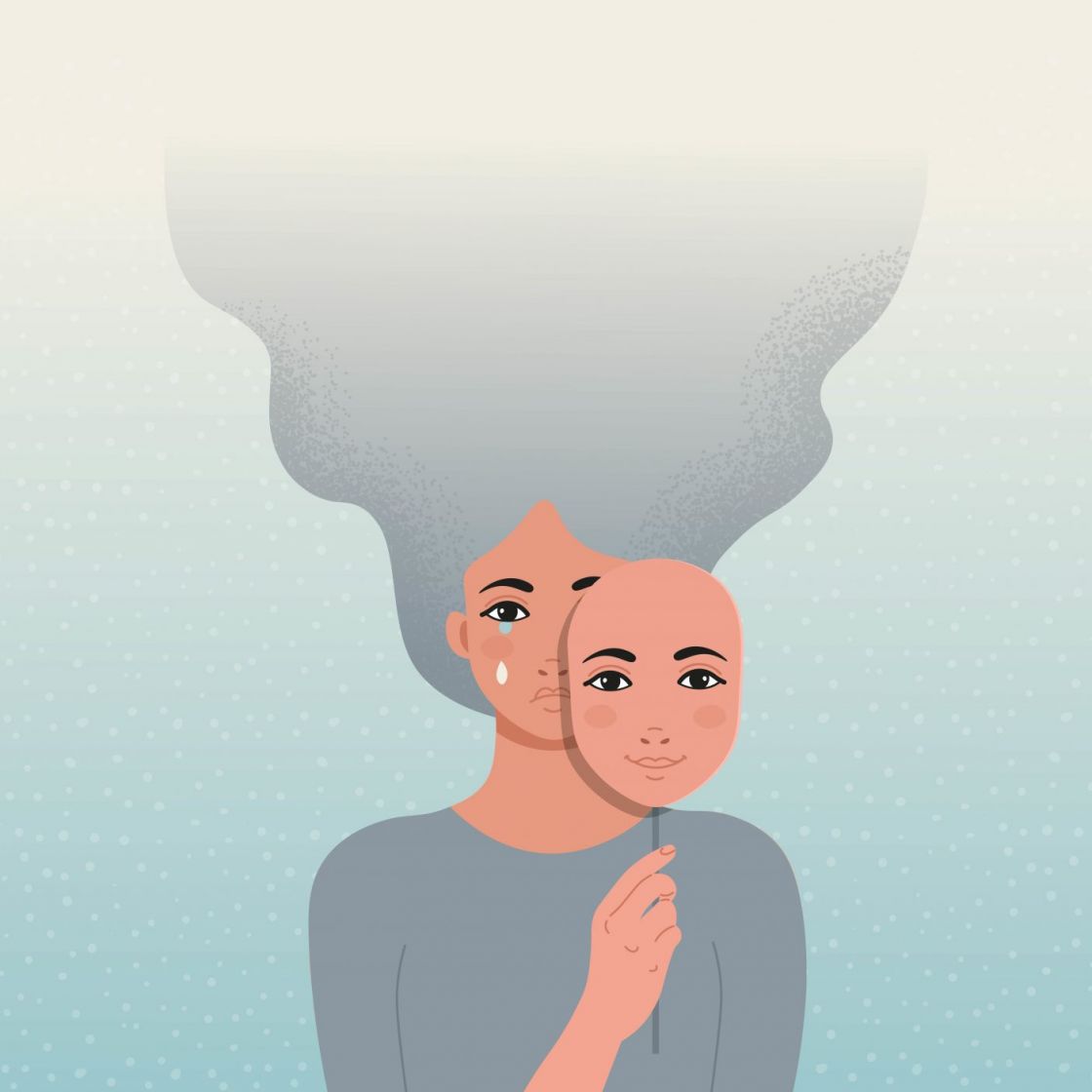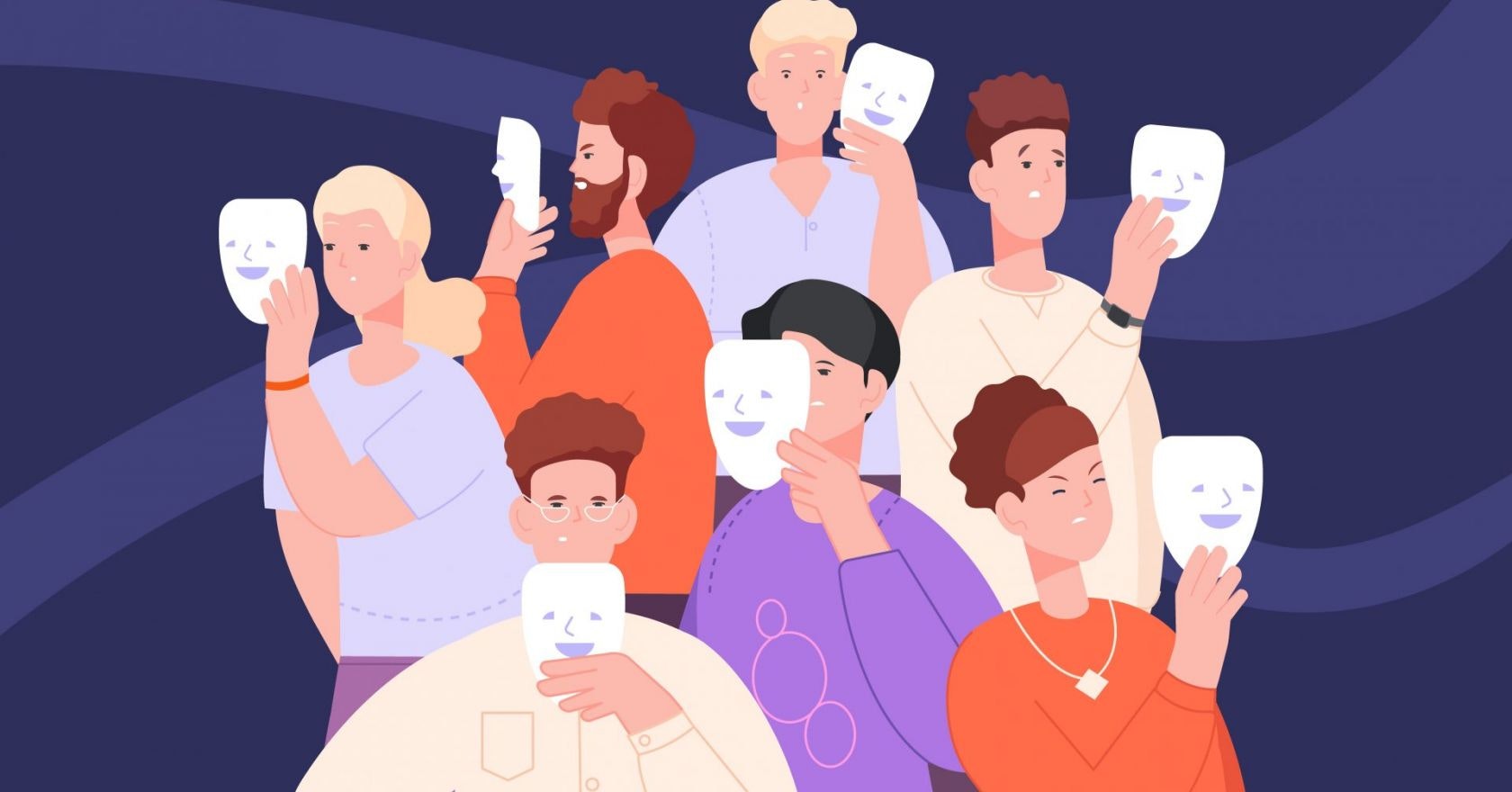Written by Meg Walters
Covid-19 restrictions may have lifted, but some of us are still wearing masks – and they’re not the masks you’re thinking of. In a world where toxic positivity reigns supreme, more and more people find themselves slipping on a “positivity mask” without even realising it.
How often do you show how you’re really feeling? The answer is probably: not very often. Being a part of society means we often have to hide our true feelings just to get through the day. We give a polite smile to the person who accidentally stands on our toe in the queue for the bus. We utter a cheery, “Fine, thanks,” when our colleagues ask us how we’re doing. We sit and listen calmly to a friend rant on and on about her latest drama. It’s normal to wear a mask from time to time.
But for some people, wearing a ‘positivity mask’ has become such a deeply ingrained habit that it becomes almost impossible to take it off when it really matters. In her 2022 book Toxic Positivity, as outlined by Tania Luna in Psychology Today, psychotherapist Whitney Goodman outlines how our culture’s ever-increasing obsession with positivity can sometimes lead to a dangerous habit of masking our emotions to present a perpetually cheery face to the world – and sometimes, this practice can become toxic or even dangerous.
What is a ‘toxic positivity’ mask?
Masking is a term often used to describe a phenomenon that can happen in people with autism or ADHD. In this type of masking, people find themselves developing emotional masking techniques, such as copying the behaviour of others, in social situations to feel more socially accepted.
Positivity masking is a little different.
According to Goodman, a positivity mask is something we put on (metaphorically, of course) without even consciously realising we’re doing it. Under the pressure of society to be happy and successful, we develop a habit of feigning positivity even in private moments with ourselves.
“Many of us are so keen to invalidate our own emotions that they take second place to making others feel comfortable, so we wear a mask of fake positivity,” suggests Joanna Konstantopoulou, health psychologist and CBT specialist. “Comedians and influencers are often masters at this, to the detriment of their own mental health since emotional needs are rarely explored and met.”
This masking phenomenon is a result of a culture of toxic positivity. “There is definitely a pressure in our society to be positive and happy,” explains Kasia Richter, psychologist and wellbeing strategist. “A lot of people simply don’t have the right resources in order to be genuinely positive, yet they do their best to pretend in order to fit it. They adopt the ‘fake it till you make it’ attitude.
“Toxic positivity occurs when our positive attitude is not authentic, not aligned with our real thoughts and feelings, and it becomes like a mask we put on in order to appear as a positive-thinking person,” she says.
According to Richter, our main five emotions as human beings are fear, anger, joy, sadness, disgust and surprise. When we habitually repress some of these naturally occurring emotions, things have a tendency to build up inside.
Why wearing a positivity mask can be dangerous
On one hand, constantly wearing a positivity mask can be tiring and lead to a buildup of negative emotions that have nowhere to go.
“There are studies that clearly show people working in customer-facing roles where they are forced to put on a fake smile for several hours a day experience deep distress as the emotions they showcase are not aligned with how they truly feel,” says Richter. “A lot of research is indicating that not expressing our feelings accordingly leads to an increase in stress levels, anxiety and depression.”

As Goodman explains, a positivity mask can also separate us from our underlying needs. If we habitually ignore our negative emotions, she suggests, we will never understand where they have come from and develop a more intelligent understanding of what we really want and need.
But a positivity mask doesn’t only harm ourselves – it can harm others, too. When we adopt an attitude that positivity should always come first, we may begin to blame others for their negative emotions just as we would blame ourselves. In some cases, this can even lead us to perpetuate systemic imbalances in society. “For example, telling someone who is experiencing discrimination to ‘cheer up’ or ‘be grateful’ does nothing to change the reality of discrimination for them or others,” writes Luna.
Spotting the signs that you wear a positivity mask
One of the biggest problems with the positivity mask phenomenon is that we don’t always know we’re guilty of it ourselves. Here are some signs Richter suggests looking out for:
- You find yourself not showing any other emotions but joy and happiness
- You feel that you always keep your guard up
- You find yourself explaining away other people’s feelings
- You feel guilty when you express negativity
- You immediately want to make yourself or others feel better before understanding what’s really going on
Learning to remove the mask
If you have the habit of putting on a positivity mask when you’re with others or even when you’re alone, it can be hard re-learning how to accept the full spectrum of your emotions.
“The key to removing this mask is to fully explore each and every negative emotion,” says Konstantopoulou. “Acknowledge the emotion that you’re feeling and validate it so that you understand why you might be feeling this way.”
For instance, if you feel angry that you didn’t get your dream job promotion, avoid shoving away your anger. Avoid giving yourself affirmations like “I’ll get it next time,” or “Everything happens for a reason.” Allow yourself to feel it and decide what it is you should do to have your needs met, whether that is to air your disappointment to your manager or look for another job.
It’s also important to practise the same thing with others. “Have the same respect for others who are trying to process their emotions,” she says. “Don’t brush their feelings aside by suggesting others are worse off.”
While it may take time to rewire your mental habit of wearing a positivity mask in your day-to-day life, ironically, you’ll probably feel a lot better after allowing yourself to feel a little worse.
Images: Getty
Source: Read Full Article
